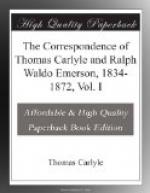----------- * The allusion referred to is the following: “By the kindness of a Scottish Hamburg merchant, whose name, known to the whole mercantile world, he must not mention; but whose honorable courtesy, now and before spontaneously manifested to him, a mere literary stranger, he cannot soon forget,—the bulky Weissnichtwo packet, with all its Custom-house seals, foreign hieroglyphs, and miscellaneous tokens of travel, arrived here in perfect safety, and free of cost.”—Sartor Resartus, Book I. ch. xi.
** An article by the Rev. N.L. Frothingham in the Christian Examiner. ----------
Your little azure-colored Nature gave me true satisfaction. I read it, and then lent it about to all my acquaintance that had a sense for such things; from whom a similar verdict always came back. You say it is the first chapter of something greater. I call it rather the Foundation and Ground-plan on which you may build whatsoever of great and true has been given you to build. It is the true Apocalypse, this when the “Open Secret” becomes revealed to a man. I rejoice much in the glad serenity of soul with which you look out on this wondrous Dwelling-place of yours and mine—with an ear for the Ewigen Melodien, which pipe in the winds round us, and utter themselves forth in all sounds and sights and things: not to be written down by gamut-machinery; but which all right writing is a kind of attempt to write down. You will see what the years will bring you. It is not one of your smallest qualities in my mind, that you can wait so quietly and let the years do their best. He that cannot keep himself quiet is of a morbid nature; and the thing he yields us will be like him in that, whatever else it be.
Miss Martineau (for I have seen her since I wrote) tells me you “are the only man in America” who has quietly set himself down on a competency to follow his own path, and do the work his own will prescribes for him. Pity that you were the only one! But be one, nevertheless; be the first, and there will come a second and a third. It is a poor country where all men are sold to Mammon, and can make nothing but Railways and Bursts of Parliamentary Eloquence! And yet your New England here too has the upper hand of our Old England, of our Old Europe: we too are sold to Mammon, soul, body, and spirit; but (mark that, I pray you, with double pity) Mammon will not pay us,—we, are “Two Million three hundred thousand in Ireland that have not potatoes enough”! I declare, in History I find nothing more tragical. I find also that it will alter; that for me as one it has altered. Me Mammon will pay or not as he finds convenient; buy me he will not.—In fine, I say, sit still at Concord, with such spirit as you are of; under the blessed skyey influences, with an open sense, with the great Book of Existence open round you: we shall see whether you too get not something blessed to read us from it.




